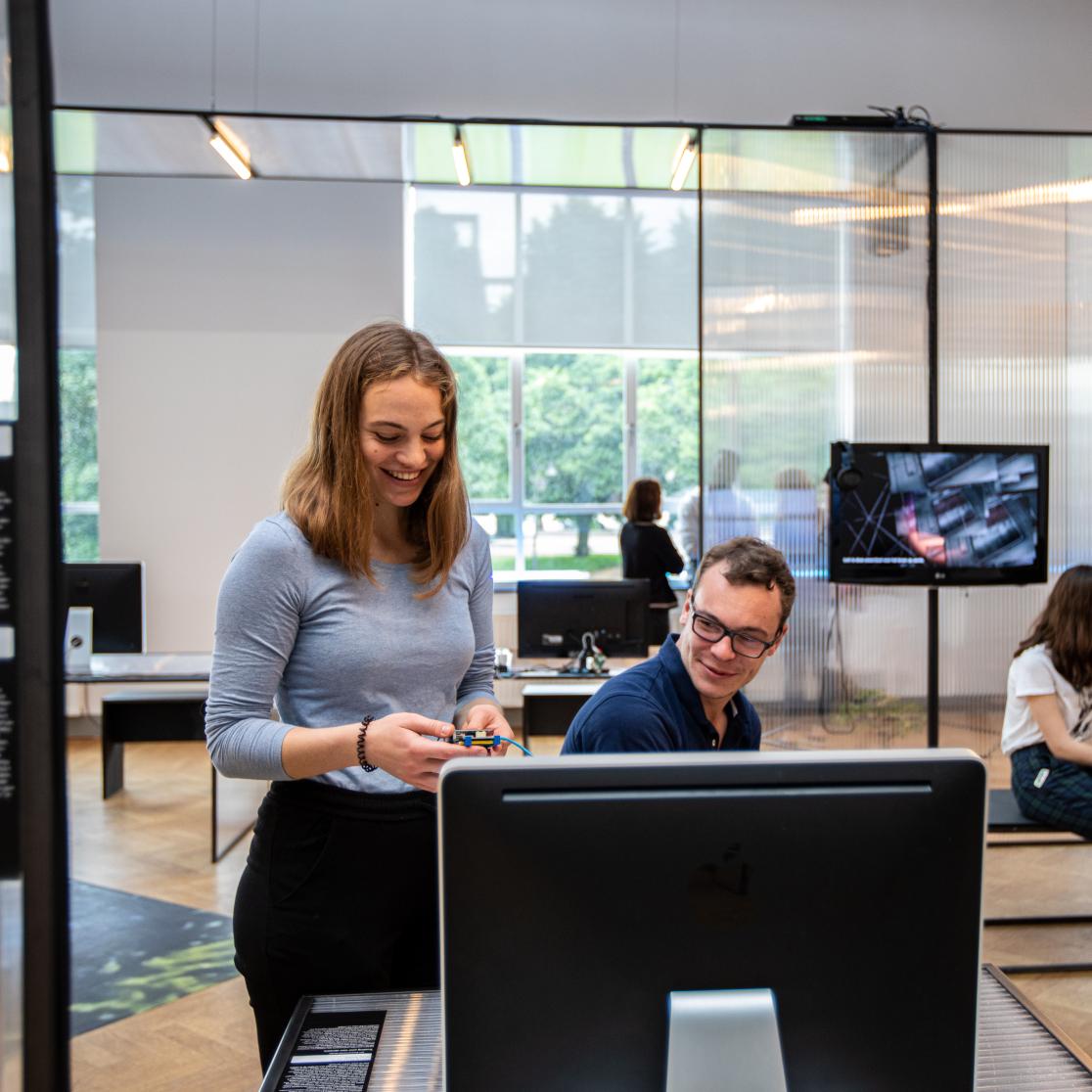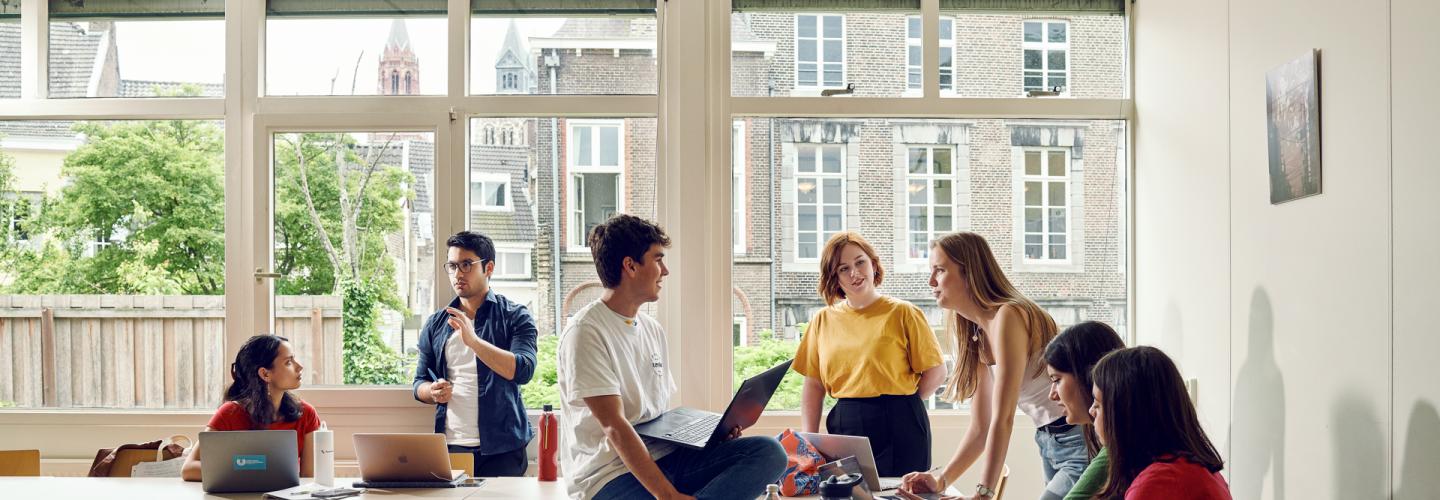Why this programme
Modern-day societies face complex challenges. How do new and emerging technologies, like AI or biotechnology, change how we see ourselves and the world? How do we navigate cultural diversity and questions of identity in an increasingly polarized world? How do power and representation work, through politics, media or art?
In the bachelor’s program of Arts and Culture, you will interpret and explain these challenges through the lens of culture. Using an interdisciplinary mix of history, philosophy, art and literature studies and science and technology studies, you will gain intricate understanding of how science, media, technology, politics and art influence each other and the world.
You will learn to:
- Trace the historical roots of modern Western culture in a globalizing world.
- Reflect critically and engage in debate on current social and ethical issues.
- Analyse complex problems from multiple academic angles.
- Approach issues with the mentality of a researcher.
About programme
The programme is divided into two phases: the elementary phase and a graduation phase, each lasting one and a half years. Courses build progressively, helping you grow into an interdisciplinary thinker equipped to understand today’s complex world.
In the elementary phase, you will explore key questions in the development of Western culture in a global context, starting with Antiquity and ending with 21st century global politics. In this phase, you will trace how philosophical and ethical debates, scientific revolutions, political ideologies, artistic movements and technological developments have shaped modern culture—and continue to influence how we see and navigate today’s world. All students follow this foundational phase.
In the graduation phase, you tailor your studies to your interests. You will choose elective courses that focus on intersections of cultural domains: media, art & literature, politics, science & technology. You will apply your learning to contemporary debates, such as migration and representation, new and emerging technologies, or the digitalisation of society. Or you can explore democratic principles and practice, body norms, and scientific and political responses to climate change.
Throughout both phases, you will train essential academic, research and writing skills. A dedicated skills trajectory further guides you in mastering key research methodologies and developing writing skills. Step by step, you will take on more complex assignments—culminating in your bachelor’s thesis in year three.
At the start of your third year, you can do an internship or study abroad. You can also follow a minor or choose to take courses at another faculty, other university or the Maastricht Academy of Fine Arts and Design.
This programme is for students who:
- Are curious, have an inquisitive mind and a broad academic orientation
- Love reading, writing and drawing connections
- Like looking at complex problems from multiple angles
- Thrive in a small-scale, interactive teaching system
- Enjoy both independently and with others
- Value international perspectives and dialogue

International classroom
Our programme is internationally oriented, not just in content but also in the classroom. When you closely interact with people from all over the world, you learn to reflect more deeply on Western cultural perspectives. 65% of your classmates in the first year come from abroad, representing over 22 nationalities, and 42% of your teachers are international—from the Euregion as well as overseas. Such diversity broadens your worldview and contributes to an international atmosphere. Next to this, you will have the opportunity to spend a full semester abroad at one of our +/- 100 partner universities worldwide, do an internship at an international organisation, or a minor at another faculty.
Problem-Based learning
At Maastricht University, you will learn using Problem-Based Learning (PBL). In small tutorial groups with a maximum of 15 students, you will analyse challenging questions and cases. This will bring you into close interaction with our tutors and your fellow students. Together with your group, you will seek further knowledge, discuss your findings and formulate answers. Instructors only give help as it’s needed, allowing you to develop the independence and problem-solving skills you will need in your future study and professional career. You will not only gain factual knowledge but will also learn how to work in international teams, present a convincing argument, and carry out academic research.
Skills trajectory
The Arts & Culture skills trajectory consists of courses that familiarise you with key research methodologies in both academic and professional settings. You will progressively learn relevantacademic research and writing competences, apply various methods, and practise strategies for selecting and eliciting relevant material. You will tackle important issues like how to formulate a good research question and how to apply theories and use methodology. This training programme helps you develop not just academic research and writing skills, but also trains you for future job-related competences, such as using concepts, applying research methods, analysing sources, thinking critically and presenting. You will become familiar with several different methodological approaches and with more general practical and ethical choices, as well as with challenges you will encounter when doing research.
- More information on the skills courses can be found on the Courses & Curriculum page.
UM and FASoS Campus Tour
Welcome to the FASoS campus tour! In this video, one of our student ambassadors will take you on a journey through our faculty, the inner city, and all the important UM buildings. If you’d like to explore further, we also offer campus tours during our Open Days, Experience Days, and Introduction Days. Enjoy the tour!
Honours+ programme
University wide Honours+ component
The Honours+ Programme consists of three types of activities. Students attend workshops to develop professional skills; help organize a series of DIY lectures; and co-author contributions to the digital magazine Excellium.
If you complete the Honours Programme successfully you will receive a special Honours Programme Certificate, in addition to your diploma, when you graduate. ECTS credits are not awarded.
FASoS Honours component
The faculty of Arts and Social Sciences offers its most ambitious bachelor’s students the opportunity to take part in the Honours Programme.
You do not need to contact the Faculty if you belong to the top 4 to 5 per cent of students of the first year (based on average grade) who passed all their first-year courses and skills trainings at the first attempt: you will be invited to apply.
Honours programme students are given the freedom to study academic topics in depth. The programme consists of various components, from which you choose two. For example, you could undertake a small-scale, comprehensive six-week project under the guidance of a faculty professor. This could be a small research project or consist of reading and discussing several books. You could also participate in faculty research, choose an individual assignment such as writing a paper, or take a second minor at the Faculty.
More about the FASoS Honours Programme
